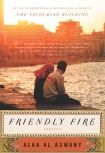Friendly Fire by Alaa Aswany (best e book reader TXT) 📗

- Author: Alaa Aswany
Book online «Friendly Fire by Alaa Aswany (best e book reader TXT) 📗». Author Alaa Aswany
At lunch my father would drink a glass of rum, a habit that helped him to sleep well during his siesta, or so he said. The rum would send its warmth through my father’s body and he’d talk to us—me and my mother—and laugh, and sometimes a mysterious melancholy would seep into him, but on this one day he seemed more than usually upset. He kept fiddling with his mustache in silence, his eyes staring into space, and when my mother asked him, “What’s wrong with you?” my father (who seemed to have been waiting for the question) sighed deeply, took a gulp from his glass of rum, and said, playing with a matchstick between his teeth, “Would you believe, I got a letter today from someone who admires my work.”
My father seemed embarrassed and went on in a louder voice as though saying something he’d prepared ahead of time, “Naturally, I’m happy, as any artist would be, to get a letter from an admirer. But what makes me happier is that there’s someone out there who actually follows the figurative arts in Egypt in these days of ours.”
There was silence for a moment and my father took a sip from his glass. I looked at my mother and got the impression that she wanted to say something but hadn’t yet worked out what, so I jumped in with, “So where’s the letter?”
“Over there by you, in the pocket of my jacket.”
I got up and inserted my hand into the pocket of the jacket hanging on the coat rack in the corner of the parlor, and pulled out the letter. The envelope was written in an elegant black hand “Abd el-Ati, Life, 6 Qasr el-Aini Street.” I opened the envelope and pulled out the letter, and as I started reading my mother exclaimed, “Read it out loud, Isam.”
I haven’t mentioned the sender’s name, which was Mahmoud Ali Farghal, from Minyet el-Nasr, Governorate of el-Daqahliya. He said that he worked as a school art teacher and did oil paintings and dreamed of becoming a great artist like my father. He asserted that he followed my father’s work in Life every Wednesday and had seen one exhibition that my father had put on in Cairo some years ago and that though he’d come to Cairo especially to see the exhibition, and had wanted to talk with my father, his great shyness had prevented him from introducing himself. All the same, he averred again that he would be visiting my father soon at his Life office so as to make his acquaintance and show him his work. He ended the letter with the words, “Kindly accept the salutations of your pupil and disciple, Mahmoud Ali Farghal.”
That Farghal was a genuine admirer of my father’s work was a possibility not to be dismissed, for one is always coming across a certain type of person who interests himself in matters no one but he knows anything about and gets very enthusiastic about them, such as the people who support the Tirsana soccer club or devotees of the voice of Abd el-Latif el-Tilbani, for example.* Equally possible was that Farghal was a hypocrite who wanted to get close to my father so that the latter could help him in some way or give him an introduction to someone.
When I finished reading the letter, my father was blushing with ecstatic joy. He started fiddling with the fork on his empty plate, a happy look in his eyes, and he pursed his lips like a child trying not to smile. My mother, who only now seemed to have taken in what was happening, burst out with, “Wonderful, Abduh! Congratulations! I think we ought to frame the letter and hang it in the sitting room.”
I laughed out loud and my father shouted in protest, “What’s all this nonsense about framing and hanging? You really are a dumb cow.”
My mother turned pale for a moment but then burst out laughing and mumbled, “Never mind, never mind. No framing. Don’t get mad.”
My father lit a cigarette and explained to her, this time in a calm, restrained voice, that his happiness was not because he had an admirer but on behalf of the figurative arts, an idea that he then expatiated on at length and in various formulations. Then he moved on to a lot of stuff about the great artist’s duty toward the talent of the rising generation and spoke about his professors of painting and how they’d encouraged him. I felt that my father was looking forward to the day when he would meet Farghal and that he would make every effort to help him.
My father went into his room to sleep, my mother took the dishes into the kitchen, and I sat on my own. The letter still lay before me on the table. I looked at it. Farghal’s writing was beautiful and polished. I stretched out my hand and took the letter and the feel of the paper on my fingers was smooth and uniform. I looked at the picture of my father and mother in their wedding clothes that hung on the wall. At first I thought about the style of my father’s suit in the picture. Then I lost my concentration for a moment and found myself grasping the piece of the paper in my hands. I was tearing it in half. The tearing made a quietly rough sound. An obscure anxiety gnawed at me when I finished but I dismissed it and hurried—as though to reassure myself—to rip it into small pieces, and then even smaller ones. Each time it got harder to tear the paper but I





Comments (0)